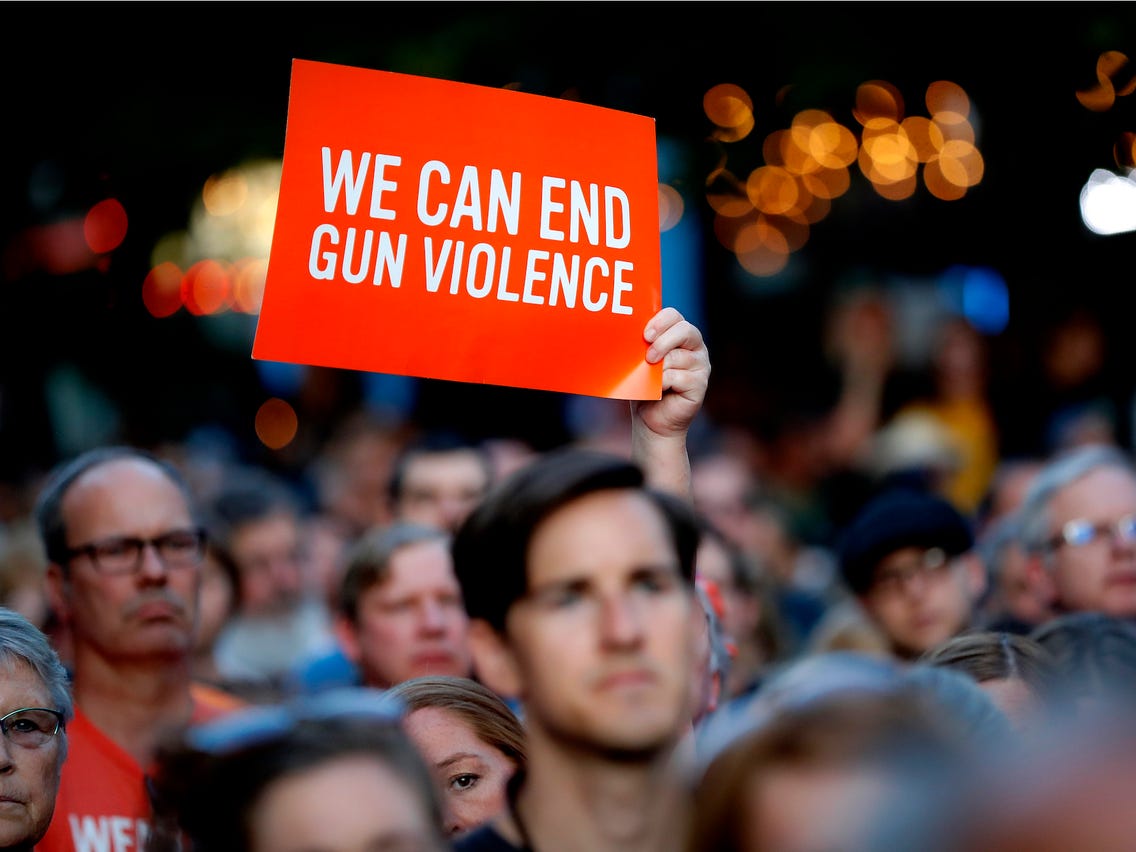Mass shootings have a profound societal impact despite accounting for only a small proportion of total murders. These events are repeatedly tied to “serious mental illnesses” in major news media and government officials’ speeches. Research, however, suggests that the link between mental illness and gun violence is largely a myth. Now, a new study from prominent psychiatric researchers at Columbia University confirms that a small minority of violent events and shootings can be connected to “mental illness” and that policies targeting legal issues, substance use, and difficult life events would be more effective for prevention.
The research was led by psychologist Gary Brucato and former American Psychiatric Association President Paul Appelbaum. A review of database information on 1,315 mass murders over the last century compared lifetime psychotic symptoms with the use of firearms, legal histories, drug and alcohol use, and non-psychotic psychiatric and neurological symptoms. The research suggests that prevention policies targeting all indicators except lifetime psychotic symptoms will yield a more substantial impact than those policies that target serious mental illness only.
“These results suggest that policies aimed at preventing mass shootings by focusing on serious mental illness, characterized by psychotic symptoms, may have limited impact,” they conclude. “Policies such as those targeting firearm access, recreational drug use and alcohol misuse, legal history, and non-psychotic psychopathology might yield more substantial results.”
 Former President Donald Trump declared in 2019 that people diagnosed with such mental illnesses should face involuntary confinement as a means to prevent mass shootings. Commentators have long suggested that blaming mental illness conveniently circumvents discussion of the role of racially motivated hatred, terrorism, and gun violence (for example, in the 2015 Charleston church massacre).
Former President Donald Trump declared in 2019 that people diagnosed with such mental illnesses should face involuntary confinement as a means to prevent mass shootings. Commentators have long suggested that blaming mental illness conveniently circumvents discussion of the role of racially motivated hatred, terrorism, and gun violence (for example, in the 2015 Charleston church massacre).
In 2019, the American Psychological Association echoed this sentiment, issuing a statement that blaming mass shootings on mental illness is “unfounded and stigmatizing.” Indeed, widely cited research has found that only 4% of all violent behavior toward others can be attributed to ‘serious mental illness.’
Psychiatrists at Columbia University and New York State Psychiatric Institute examined global personal-cause mass murders, scrutinizing historical information regarding the perpetrator, use of firearms, demographics, legal history, drug use and alcohol misuse, and history of symptoms of psychiatric and neurological illness.
Inferential statistics were run on the most comprehensive, global large data set, including less-studied mass murderers – those carried out through means other than firearms – among 1,315 total mass murders occurring between 1900 and 2019. 65% of these involved firearms.
The study was unable to statistically compare U.S. instances to other countries because of the latter’s low prevalence of mass shootings. Of U.S.-based mass shooters, those with symptoms of psychiatric and neurological illness more frequently used semi- or fully-automatic firearms. U.S.-based shooters as a whole were more likely to have “legal histories, use recreational drugs or misuse alcohol, or have histories of non-psychotic psychiatric or neurological symptoms.”
Against the false association between severe mental illness and mass shootings, they write:
“…it appears to play a significant role in only a small fraction of cases, with the correlation depending on whether the definition conservatively involves only severe mental illness, such as that characterized by psychotic symptoms, or more widely encompasses psychopathologies such as non-psychotic mood and anxiety disturbances, personality disorders, substance and alcohol use disorders, and maladaptive reactions to adverse life events. Persons with mental illness, moreover, are far more likely to be victims of violence than to perpetrate it.”
Mass murderers using firearms were significantly less likely to have a lifetime history of psychotic symptoms than mass murder perpetrated through other methods: 18% of mass murderers who did not use firearms had a history of psychotic symptoms, compared to 8% of mass shooters. They note that individuals with psychotic symptoms may be less likely to acquire, or to be able to acquire, firearms.
These results are consistent with other reported rates of mental illness among mass murders when the definition is limited to severe disturbances, like psychotic symptoms.
The relationship between psychiatric symptoms and mass murder may be less associated with psychotic symptoms than with subacute, more common psychopathology, such as depressive symptoms, personality-based symptoms, drug or alcohol use, and reactions to adverse life events.
This wider definition includes people who may harbor serious anger and resentment about feelings of social rejection and exclusion. The misunderstanding may well be the cause of the belief in the association between severe mental illness and mass shootings that gives rise to undue stigma.
They identify numerous important limitations that exist in this type of work. The first of which is the validity of psychiatric symptoms gleaned in media and justice system records. Additionally, they write:
“Cases identified in our sources may have been more likely to involve psychiatric symptoms, given their news value, or may have involved other unusual elements associated with psychosis, potentially leading to an overestimate of the association with psychotic symptoms.”
Moreover, the study did not consider socio-cultural determinants and broad-scale shifts across the time period within which records were analyzed (e.g., changes in the prevalence of psychiatric symptoms and media attention they are given, changes in firearm availability), though these do play significant roles in understanding prevalence.
These findings have important implications for understanding the drivers of mass shootings. This, in turn, may enable policies to be shaped to better prevent them in the future, without needlessly stigmatizing people who have symptoms associated with ‘severe mental illness.’
****
Brucato G et al. (2021). Psychotic symptoms in mass shootings v. mass murders not involving firearms: findings from the Columbia mass murder database. Psychological Medicine 1–9. https://doi.org/10.1017/S0033291721000076 (Link)















The “Elephant in The Living Room” is AKATHISIA and the Official Cover Up of AKATHISIA:-
Licence To Kill
https://drive.google.com/file/d/1vYO9r1FkdJSv8Bi8Q3c3u9WXNZXkmxvO/view?usp=drivesdk
Information Fiddling
https://drive.google.com/file/d/1bTUsvmamFk3-CA0wKPDlJMakxLGUJFBq/view?usp=drivesdk
Report comment
Restricting rights based on hateful labels such as “mental illness” is a crime against humanity. And there is no such thing as “gun violence”; guns are inanimate objects with no brains or souls. So why is it even necessary to discuss such a “topic”?
Report comment
“So why is it even necessary to discuss such a ‘topic’?”
Because many psychiatrists and psychologists are still regularly defaming their clients, and those of us who stand against child abuse, as “violent” or “dangerous.” Despite the reality that the vast majority (likely over 80%) of the psychologists’ and psychiatrists’ clients (the DSM defamed) are child abuse victims, NOT “violent” perpetrators of crimes.
https://www.madinamerica.com/2016/04/heal-for-life/
https://www.indybay.org/newsitems/2019/01/23/18820633.php?fbclid=IwAR2-cgZPcEvbz7yFqMuUwneIuaqGleGiOzackY4N2sPeVXolwmEga5iKxdo
But I do totally agree, oldhead, defaming people with “hateful labels such as ‘mental illness’ [are systemic crimes] against humanity.” As is participating in a multibillion dollar, primarily child abuse covering up – and child abusing – system, and/or attempting to “maintain” that satanic “status quo.”
Especially since the DSM “status quo” was confessed to be scientifically “invalid” 8 years ago, by the head of the NIMH. And the psychiatric “status quo” is murdering “8 million” – largely innocent victims of crime – every year, also according to the head of NIMH, with their psychiatric neurotoxins.
https://www.nimh.nih.gov/about/directors/thomas-insel/blog/2013/transforming-diagnosis.shtml
https://www.nimh.nih.gov/about/directors/thomas-insel/blog/2015/mortality-and-mental-disorders.shtml
https://www.alternet.org/2010/04/are_prozac_and_other_psychiatric_drugs_causing_the_astonishing_rise_of_mental_illness_in_america/
https://en.wikipedia.org/wiki/Neuroleptic-induced_deficit_syndrome
https://en.wikipedia.org/wiki/Toxidrome
Note: All doctors are taught in med school that both the antidepressants and antipsychotics can create “psychosis,” via anticholinergic toxidrome.
Report comment
No problem seen here. When you’re “seriously mentally ill” is when you’re most likely to have become “cosmetically” ill, where you look and act crazy enough so that the most casual observer can tell you aren’t “playing with a full deck”.
Picture yourself as a clerk in a gun store when George Washington, complete with the skin-tight pants and tri-cornered hat rushes into your store demanding to buy an AK or M16 lookalike because British agents are following him down the street and he needs to run them off by showing them he’s armed and carrying hundreds of rounds of ammunition preloaded into 30-shot magazines. Unless you belong to some outfit like the Proud Boys, who don’t believe people with native ancestry are real Americans and that monstrous conspiracies involving thousands of secret members are running our governments, the proposed sale is a no go.
Report comment
Unfortunately no mention of the close association between prior domestic violence and mass shootings. “Legal histories” is an ambiguous term and most of us have at least a traffic ticket or two in our legal history. Also no mention of the overwhelmingly male representation of mass shooters.
Lastly, no mention of the fact that the organizations fighting for restrictions on gun ownership largely aren’t doing so on the prevention of mass shootings but are purposely muddying the waters with notions of suicide prevention. Gun suicides are largely carried out by middle aged white men who’ve recently suffered an adverse life event such as job loss or divorce.
The sanest way to regulate firearms is no different from how we regulate other dangerous objects such as motor vehicles. That is, training, licensing, insurance, and built-in safety features like smart trigger locks.
Report comment
Well said. If we were going to “profile” the dangerous person who needs to have an eye kept on them, it would be a younger male domestic abuse perpetrator with a substance abuse problem (or on certain psych drugs) and an obsession with weapons. “Mental illness,” whatever that means, would not even make it onto the board as a risk factor. Most gun owners are safe, most people labeled “mentally ill” are safe. We should be looking at the actual risk factors if we are going to try and prevent such situations from arising.
Report comment
You might be right Steve, but in my experience most aggressive
men tend to be a bit older.
Report comment
I’m just going from stats here. Most mass shootings are perpetrated by young men who are misogynistic and have a history of drug abuse, or are on psych drugs. I am certain older men would factor in there as well, as being MALE is the most common characteristic by far of all shooters. My point is, if we’re going to create a profile, we ought to base it on actual correlations, and “mental illness” doesn’t even come close to making the cut!
Report comment
Just to note that all men are misogynistic at some level so that’s not really a valid descriptive distinction.
Report comment
OK, HIGHLY misogynistic. You get the idea.
Report comment
It’s not just men who are sexist. Society teaches that sexism is how things should be. Those who don’t follow this are bullied. As a result even some (many?) women have internalized sexism as acceptable. I was dumbfounded in 2016 when I heard several educated women sayings things such as, “I don’t want a women president.”
When I tell people with “mental illness” labels they are not biologically defective, or that the drugs increase violence, decrease cognitive functioning, and have other negative effects a common response is something along the lines of “you’re shaming/stigmatizing me.” I’m not sure I want to even try to publicly hypothesize what causes this response.
Another common response is to assume I am “mentally ill” and ad hominem that I inherently lack insight. I have also been told in the same conversation where I was ad hominem as “mentally ill” that since my comments are coherent I can’t be “mentally ill” and therefore lack insight.
Report comment
I agree with all you say above.
Report comment
Well, some people love to nurture their “disorders” or “madness” or whatever; basically you’re seen as a “pill shamer.”
Both racism and sexism are cultivated by the capitalist social order, but the people are then held responsible, rather than their teachers. (You don’t expect reparations to be paid by those who actually profited the most from slavery, do you?)
Report comment
Wait — was the role of SSRI’s actually ignored here completely?
Report comment
Removed for moderation.
Report comment
The article mentions how shootings are tied to anger and resentment. A good way to make someone angry and resentful is to forcibly hospitalize (jail) and drug them. Giving them less rights than criminals because a 5 minute questionnaire similar to internet spam quizzes says they are mentally defective will further cause anger and resentment. The social stigmatization from being labeled a mental defect who is considered dangerous is fuel to the fire. Any complaints they have are met with “seek help and take drugs”. These drugs cause irritability, agitation, anxiety, and suicide/violence (serotonin drugs which are widely considered the safe psych drug increase suicide and violent behavior by 250%) meaning they are like bathing the wood stove in gasoline.
My favorite is when people claim drugs need to be forced because someone in withdrawal from the drugs does something violent. Alcohol companies should try it. “We took alcoholics and withdrew them and they became irritable, anxious, more aggressive and some died. Alcohol is a medicine that corrects a chemical imbalance. Anyone Saying alcohol has negative effects is shaming sick people and needs to be socially shunned.”
Report comment
Willoweed, are you sort of saying you are essentially anti-psychiatry/abolitionist-leaning at this point?
Report comment
I’ve done a rough estimate by taking the increased death rates caused by psych drugs and using age adjusted use of the drugs in the population. Psychiatry kills around half a million Americans every year using this estimate. I don’t lean toward abolishing this atrocity; I want it’s metaphorical corpse salted and radiated.
Report comment
I’ll mark this down as a “yes.”
Report comment
Removed for moderation.
Report comment
I read this morning about how Meghan Markle opening up about her suicidal thoughts on Oprah is expected to usher thousands of her fans into psy “treatment” following a trend of celebrities discussing their mental struggles and encouraging even more people to “reach out for help”. Makes one despair.
Report comment
Talk about missing the point! Her suicidal thoughts appeared to be directly related to the stresses of having to deal with the racism and classism and anti-American sentiments in the British nobility, so essentially, with social ostracism and discrimination. There is no “treatment” for abuse!
Report comment
We need to dispense the with the idea of “celebrity” period. A certain highly respected organizer I’m acquainted with refers to celebrity types as “name brand people” — not in a hostile way, more an ironic one.
I can’t even imagine myself running after someone for an autograph or something like that. But many people would ingratiate themselves even more if the had the opportunity. I’m not talking about noticing your favorite author in a crowd and saying hi or striking up a conversation, but what amounts to hero worship of someone who’s famous for being famous, like…oh, say Meghan Markle, for example…
Obviously celebrity worship demonstrates a void in someone’s life, so when someone’s chosen demigod starts pushing “therapy” it’s not a minor thing. Someone should complain.
Report comment
come to the lake with you
Report comment